
11 minute read
Building better lives
Every year, the Masonic Charitable Foundation (MCF) supports around 5,000 Freemasons and their family members with grants and support services totalling £15 million. The MCF also provides grants to roughly 500 local and national charities each year, with funds totalling an additional £5.5 million
Don’t man up; open up
The MCF is encouraging men to break the silence and seek support
‘M an up, it’ll be fine!’ is a phrase that most of us will have heard many times. Although often motivated by good intentions, being told to ‘man up’ can blur our understanding of what it means to be a man.
Traditionally, society has perceived masculinity in terms of strength, stoicism and control. Although these are not negative characteristics, research from the Mental Health Foundation shows these expectations can have a negative impact on mental and physical health, and prevent men from opening up and asking for help.
In reality, being a man means being human, and being human means that, at some point in your life, you may need the support of others. Whether it’s through emotional, physical or practical support, the MCF is ready and waiting to help anyone who is facing hardship – and will never tell you to ‘man up’.
Meet Sean, Martin and Alan. Their decisions to open up led to life-changing support.
Sean ‘Before my injury I was really into fitness and adventure. You’d usually find me up a mountain, hiking or rock climbing. One day when I was out climbing, I slipped and tore my shoulder – it was agonising.
‘After that I was in constant pain. I struggled to dress myself or get out of the house, so I couldn’t work. I went to hospital and they told me the waiting time for an operation would be nine months.
‘I was really hesitant to ask the MCF for help and I was scared of being rejected. But within a month of getting in touch, I was in hospital having my operation. It felt like a massive weight had been lifted, and my mental health slowly started to improve.’
Martin ‘Ten years ago, my partner Gavin became mentally unwell and I became his full-time carer. I’ve been going through treatment for colon cancer, and this, combined with the stress of my caring responsibilities, means I haven’t been able to work.
‘I couldn’t afford to cover my rent or bills and I was served notice of eviction – I didn’t know what to do. I don’t think anyone really wants to ask for help unless they’re desperate. But it got to a point where I had to do something, so I gave the MCF a call.
‘Their support gave me breathing room to focus on my own health as well as Gavin’s. I’m just so pleased I called. I realised that it doesn’t matter what your situation is, if they can help you and you’re eligible, they will.’
Alan ‘When I was in the Middle East, there was an incident involving an aircraft that I had to investigate, and it was from this that I developed post-traumatic stress disorder. ‘After I was medically discharged I went to my GP, but the support I needed wasn’t available on the NHS. I don’t think anybody really likes to go cap-in-hand asking for anything, but when you get as low as I did, you have to do something.
‘Thanks to the MCF, I’ve now been having the treatment I need with an incredible therapist. It’s not a quick process, but I really do feel now that we are starting to make progress and I’m finding daily life much easier.’ Sean
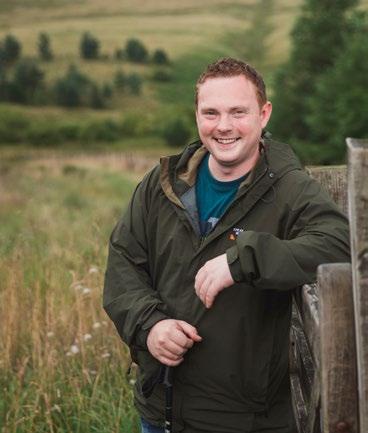
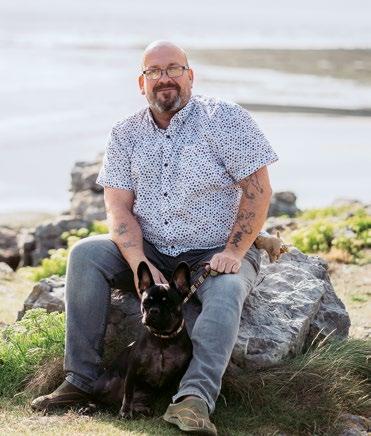
Martin
Alan
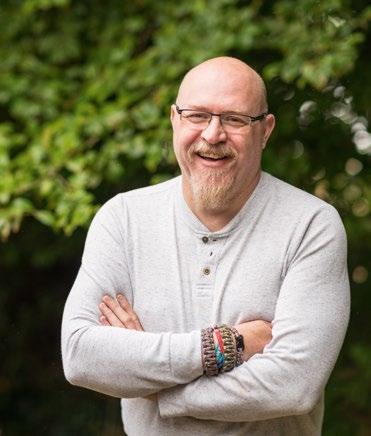
Could the MCF help you? Call 0800 035 60 90 or email help@mcf.org.uk
Over two decades, Freemasonry has donated more than £1 million to fund groundbreaking medical research at the UK’s leading dementia research charity. Claire Bromley, science communications officer at Alzheimer’s Research UK, explains how the Masonic Charitable Foundation has been key in supporting its important work
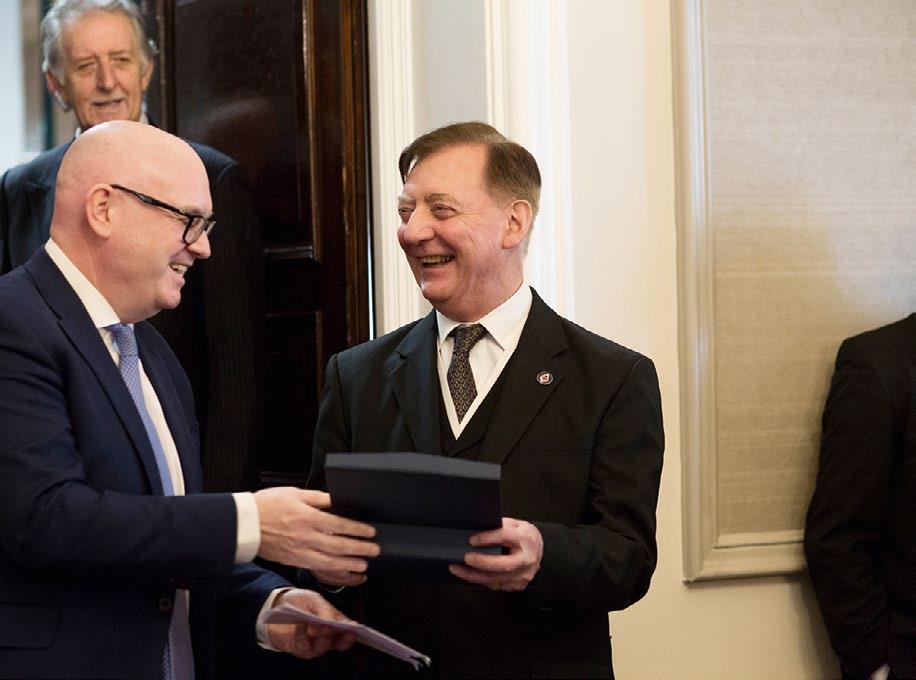
Committed support: MCF President Richard Hone accepts an Alzheimer’s Research UK award
MCF and Alzheimer’s Research UK celebrate 25-year partnership
We are delighted to be celebrating an incredible 25 years of partnership with the Masonic Charitable Foundation (MCF). As some of our most committed supporters, Freemasons have helped us grow into Europe’s leading dementia research charity.
Dementia affects 50 million people across the world and is the leading cause of death in the UK. Freemasons’ support has helped us to fundamentally increase our understanding of the physical diseases that cause dementia. These diseases involve different changes in the brain, but all damage the way nerve cells in the brain communicate with one another, attacking the very core of who we are. Each new discovery has helped us uncover the steps that drive nerve cell death, from the build-up of toxic proteins to increased inflammation and reduced blood flow. This vital insight paves the way for new diagnostic tests, preventative measures and treatments.
Pioneering early detection Damage to the brain can start up to two decades before symptoms show. While reversing damage to the brain is a huge ask, getting in early and preventing dementia is a real possibility. This requires sensitive diagnostic tests that can pick up the early warning signs. Advances in brain scans and spinal fluid tests are already improving detection of dementia today, but we urgently need more simple, cost-effective and precise detection techniques.
In 2010, the MCF supported Professor Sir Simon Lovestone in his pioneering search for a biological fingerprint of Alzheimer’s in the blood. Finding effective markers of the disease is essential, as we’ll be three times more likely to bring about a life-changing dementia treatment if we do.
The team identified ten biomarkers in the blood that give key insights about brain changes in Alzheimer’s, the most common cause of dementia.
Scientists around the globe continue to work together on these emerging blood test technologies, and researchers in this area are optimistic that we are just a few years away from a breakthrough that could see diagnostic blood tests being used routinely.
Understanding brain health Freemasonry’s generosity has also helped scientists increase our understanding of what we can do to keep our brains healthy. While we can’t change the genes that we inherit, there are lifestyle changes we can make to stack the odds in our favour. The changes include staying physically active, eating a healthy diet, drinking within recommended guidelines and not smoking. This knowledge could help prevent up to one in three cases of dementia before they even start.
Innovative drug discovery efforts Through the MCF, Freemasons have helped Alzheimer’s Research UK launch pioneering drug discovery programmes that will help translate our growing understanding of these diseases into new medicines faster.
Our Drug Discovery Alliance is currently running 21 groundbreaking projects to fast-track life-changing treatments for dementia, and in October, there was promising news that a drug called aducanumab could slow Alzheimer’s disease progression. More than ever before, this puts the first disease-modifying drug for Alzheimer’s on the horizon.
Looking to the future, a continued partnership with the MCF will help to increase research capacity, enabling fresh ideas and accelerating discovery.
Together, we can change the pace of dementia research and make breakthroughs possible, keeping people connected to their families, their worlds and themselves for longer.
RMBI Care Co. rises up the ranks
Freemasons and their families have long known the RMBI Care Co. to be a compassionate and trusted provider of residential care, nursing and dementia support, and this has now been officially recognised by the industry thanks to a recent evaluation by the Care Quality Commission
In November, Cadogan Court in Exeter became the latest RMBI care home to achieve an overall rating of ‘good’, meaning that the RMBI now has 100 per cent compliance across all its homes – a claim that very few care home providers can make.
All 18 RMBI care homes in England and Wales are now rated ‘outstanding’, ‘good’ or ‘fully compliant’ by the Care Quality Commission (CQC) and the Care Inspectorate Wales.
The CQC is the independent regulator of health and adult social care in England, responsible for making sure that health and social care services provide safe, effective, compassionate and highquality care. An ‘outstanding’ rating from the CQC is the industry gold standard, and last year just 4 per cent of care homes in England made the cut.
The RMBI is performing well above the industry average and can boast three ‘outstanding’ homes: Connaught Court in York, Devonshire Court in Leicester and Prince Michael of Kent Court in Watford. These three homes provide residential
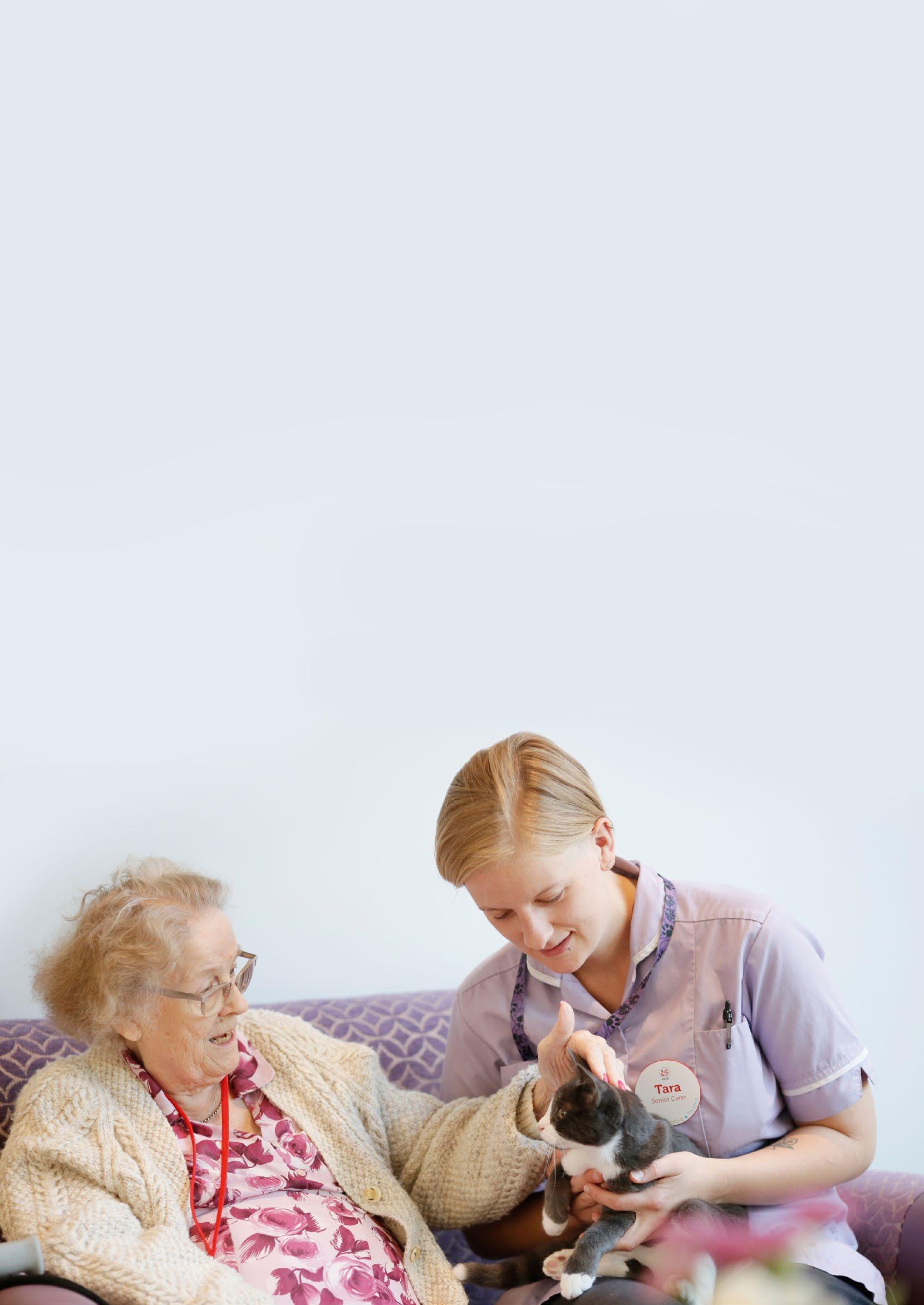
care and specialist dementia support, delivering a holistic approach to care that focuses on wellbeing and encourages residents to thrive in their new environment. In its assessment of Prince Michael of Kent Court, the CQC praised staff as being ‘highly motivated and passionate about providing opportunities for people to continue to live a full and rewarding life’ and commented that ‘the environment has been created using imaginative and inspirational ideas with a particular focus on people who were living with dementia, to support and enable them to live safely and with minimal restrictions.’
The RMBI lives by its values – to be kind, supportive and trusted – and is dedicated to delivering care services that make a real difference to everyday lives. Year on year, the RMBI works hard to raise its standards and provide the best support possible to its residents.
Mark LLoyd, Managing Director of RMBI Care Co., says: ‘I am delighted that Cadogan Court has been rated as “good” by CQC and enormously proud that all RMBI Care Co. homes are now 100 per cent compliant. Our organisation’s caring approach and our values are reflected throughout the regulator’s report.’
Cadogan Court’s latest achievement is just one example of the RMBI’s commitment to compassionate care; RMBI staff work tirelessly to keep people engaged, ensuring that their later years are as active and fulfilling as possible. It’s no surprise that 95 per cent of residents are happy to call the RMBI their home and that 97 per cent report that staff treat them with kindness, dignity and respect.
Are you considering residential care? For more information about life in an RMBI care home and how to apply, visit www.rmbi.org.uk
Compassionate care: RMBI staff work to ensure that residents’ later years are as fulfilling as possible
Need a will?
There’s a way
Vital roles
When it comes to writing or updating your will, it can be difficult to know where to start, and all too tempting to put it off for another day. If this feels familiar, you are not alone – around 60 per cent of people in the UK have not yet made a will
The problem with not making a will is that when you die, your estate falls under the rules of intestacy – which can create unwelcome surprises for those you leave behind.
Free will-writing service available To make the process of making a will as simple as possible, the Masonic Charitable Foundation (MCF) now collaborates with The Goodwill Partnership to offer a free will-writing service.
The process is easy – simply explain your wishes to a trained Goodwill Partnership counsellor in the comfort of your own home. You will receive a will that has been prepared and checked by a solicitor, delivered directly to your door. The free service from The Goodwill Partnership is available to anyone living in mainland England and Wales, regardless of whether they have a connection to Freemasonry.
To access the free will-writing service, visit mcf.org.uk/legacy. Use the code MCF001 when contacting The Goodwill Partnership.

Have you thought about your legacy?
As well as protecting the loved ones we leave behind, writing a will also provides an opportunity to make a meaningful difference to other people’s lives, long after we are gone. While some people choose to actively fundraise or make regular donations during their lifetime, others choose to remember the MCF in their will.
Last year, 10 per cent of the MCF’s income came from gifts in wills. The MCF is grateful for every legacy gift – large or small – and is proud to honour the memory of its donors through life-changing grants and services. You don’t have to leave a gift to the MCF in your will to use the free will-writing service, but any gift you do leave will be gratefully received.
Leaving a gift to the MCF For more than 40 years, David Walton was a proud and active Essex Freemason. Although by nature a serious-minded man, his sweet and gentle personality made him one of the most popular members of his lodge.
Ron Steele, David’s friend and fellow member of Sigebert Lodge, No. 7572, remembers: ‘David’s seriousness made him an ideal target for some gentle ribbing from time to time, but he always took it in good humour.’
Ron explained that David spent most of his professional life as a salesman, which at face value would have been hard to believe due to his very quiet, understated disposition. In fact, David’s success as a salesman was helped by his kind and caring nature. Sadly, David died from cancer in 2018. Unbeknown to the MCF, he had left a very generous legacy donation in his will. This donation will allow the MCF to support many more individuals in need and charitable causes for some time to come, representing David’s truly lasting legacy.
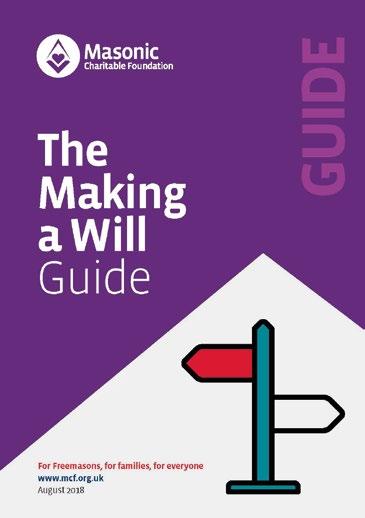
Visit mcf.org.uk/legacy to download the guide to making a will, from writing a new one to amending your existing will. It also explains how to leave a gift and the different types of legacy gifts.










